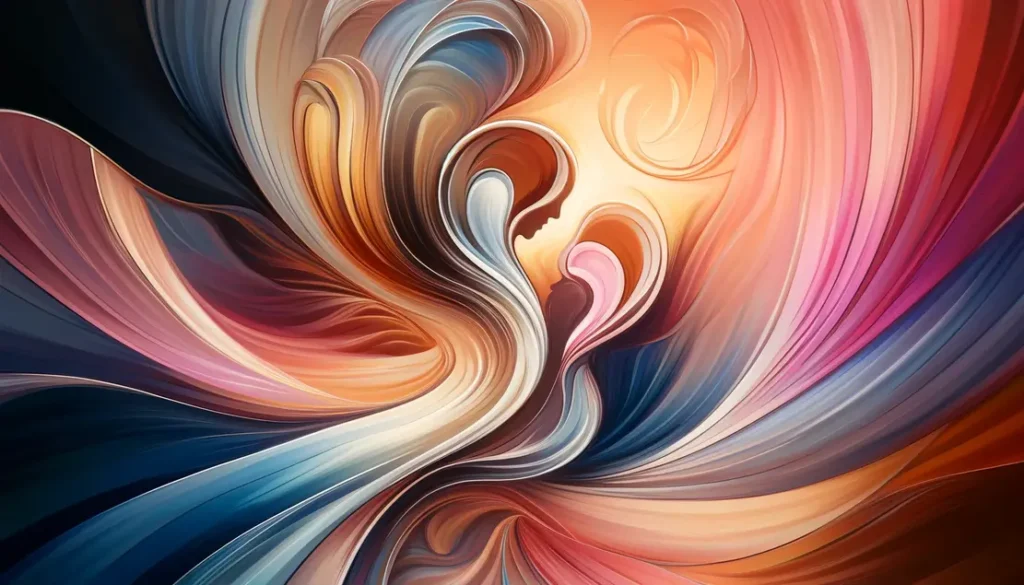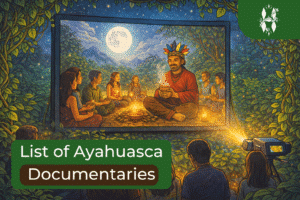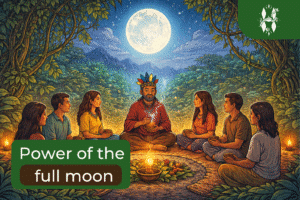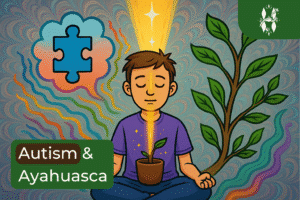You might have heard about shadow work and are starting to make your first steps with it. Now, you want to take the next step and explore your shadow with the mysterious medicine of Ayahuasca. One of the most transformative aspects of working with Ayahuasca is its ability to facilitate shadow work. But what exactly is shadow work, and how does Ayahuasca play a role in it?
Let’s explore this powerful combination and understand how it can help you uncover and heal the hidden parts of yourself.
Key takeaways:
- Shadow work involves exploring and integrating the hidden, repressed parts of our psyche to achieve self-awareness and healing.
- Ayahuasca acts as a powerful tool in shadow work, bringing repressed emotions like fear, guilt, and shame to the surface for healing and integration.
- Participants often experience intense emotional purges and gain profound insights during Ayahuasca ceremonies, leading to deep personal transformation.
- It is crucial to balance shadow work with practices that cultivate positivity, self-compassion, and love to avoid becoming trapped in a cycle of negativity.
Table of Contents
What is Shadow Work?
If you ask ten different therapists what they understand about shadow work, you would get ten different answers. The concept of the shadow self was developed by Carl Jung, who defined it as the blind spot of the psyche—the parts of ourselves that we repress and don’t like. In the story of Jekyll and Hyde, the shadow is represented by Mr. Hyde, illustrating the darker aspects of our personality that we often hide away.
In this article, we refer to the works of Dr. David Hawkins and personal experiences with shadow work. Essentially, shadow work is about becoming more acquainted with all aspects of oneself – accepting the good, the bad, the beautiful, and the ugly.
I once read a quote that resonated deeply: “The spiritual journey is not about becoming the best version of yourself, but accepting all aspects of yourself.” This perfectly encapsulates what we mean by shadow work in this context. It is the process of acknowledging and accepting the hidden parts of our psyche to achieve a more complete and authentic self-awareness.

Why It’s Important to Do Shadow Work
As much as we like to think of ourselves as transcended beings, we live in a world of duality. Light and darkness coexist, much like the concept of Yin and Yang. There is a bit of good in the bad and a bit of bad in the good – it’s the dance of balance in our existence.
Many of us are not ready to face our shadow, the “negative” aspects we carry within, such as jealousy, envy, fear, greed, guilt, and shame. How often do you meet someone who openly admits to feeling envious or greedy, or to experiencing shame? These are difficult things to acknowledge, not just to others but to ourselves as well. As a result, we pretend these sentiments don’t exist and push them deeper into our subconscious, where they can cause more harm through self-sabotage.
Must read blog: Ayahuasca and healing
Creating Projections of the Unrecognized and Unhealed Shadow
When we can’t admit these things about ourselves, they don’t just disappear. Instead, we project them outwards onto the world around us. For instance, if we suppress fear, the world can start to seem like a frightening place. This is evident in people who are deeply involved in conspiracy theories. They suppress their fear, and that fear then manifests as a belief in a threatening outside world. This isn’t about debating the validity of their beliefs but about the general energy of perpetual fear and injustice that they live in.
Similarly, suppressed guilt can lead people to view the world as hostile. Many who have grown up with very strict parents might carry a lot of buried guilt, constantly feeling they are not good enough. This internalized guilt can result in self-punishment through negative self-talk and other unloving behaviors towards oneself.
When We Get Triggered
Life often acts as a mirror, reflecting back the emotions we carry within. When we get triggered by someone else’s actions, it’s easy to blame them for making us feel a certain way. However, the truth is that they are only triggering emotions that already exist within us. For example, an unjust action might trigger our internal anger, bringing it to the surface. Few people can recognize that it’s their own unresolved anger being triggered rather than the other person “making” them angry.
Instead of viewing external events as the source of our pain, shadow work helps us see that these events are highlighting our own unhealed aspects. This realization underscores the importance of shadow work – by addressing and integrating our shadows, we can transform our perception of the world and live more authentically.
Ayahuasca and shadow work: How it can help
Ayahuasca acts as a mirror to our soul and subconscious, allowing us to see ourselves as we truly are. It can expose hidden fears, anger, shame, and guilt – emotions that cannot be easily released through conversation alone. To truly heal, we need to feel, work through, and confront these emotions. Somatic practices can aid in this process, and Ayahuasca is particularly powerful in helping us break down the walls that prevent us from looking at our “scary” shadows. By taking this medicine, we can reach a deeper level and release these stuck emotions.
What to Expect with Ayahuasca and Shadow Work
Experiences with Ayahuasca and shadow work can vary, but they generally follow two main paths, each leading to profound healing and self-awareness. These paths involve either being faced with our darkness or discovering our deeper nature of love.
Confronting Your Shadows
Ayahuasca can bring our shadows to the surface, making us face our fears, feelings of unworthiness, guilt, and shame. This confrontation is what many seek when they drink Ayahuasca, although it can also deter those who feel unprepared to face these hidden aspects of themselves. During a ceremony, Ayahuasca can amplify these emotions, pushing us to our limits to reveal our unhealthy patterns and what we need to work on. Participants often share experiences of confronting numerous fears during a ceremony. By facing these fears in the safe environment of a ceremony, we realize that we can handle them. After releasing these fears, many report feeling a deep sense of liberation – not just during the ceremony but in their daily lives as well.
Discovering Unconditional Love
Another common experience is the realization that, despite our subconscious worries about being flawed, Ayahuasca reveals our true nature as pure, unconditional love. It shows us that certain patterns prevent us from connecting with this universal consciousness of love. This understanding helps us remember our inherent nature. Many participants, including myself, have experienced this profound state of unconditional love during Ayahuasca ceremonies. Interestingly, this state doesn’t feel like an Ayahuasca-induced experience but rather a natural state of being. It feels like a deep, inherent truth about ourselves that we can carry forward into our daily lives, helping us connect more deeply with others and ourselves.
Integrating the Experience
The journey doesn’t end with the ceremony. The real work begins when we integrate these experiences into our daily lives. Ayahuasca can provide profound insights and emotional releases, but it is up to us to make the necessary changes and continue the work of integrating our shadows. This might involve ongoing self-reflection, therapy, or engaging in practices that support emotional and psychological well-being. By continuing this work, we can maintain the sense of liberation and love that Ayahuasca helps us discover, leading to a more balanced and authentic life.
Must read blog: Ayahuasca Integration

The Limitations of Shadow Work
While shadow work is an essential part of personal growth, it also has its limitations. Focusing too much on the negative aspects of ourselves—our fears, guilt, and shame—can lead to a never-ending loop of self-examination and despair. If we continually focus on what’s wrong with us and the world, these negative emotions can grow and overwhelm us. This can result in an unhealthy cycle where we are constantly looking for flaws and problems, sinking deeper into a rabbit hole of negativity.
Finding Balance in Shadow Work
Healing ultimately comes from compassion, acceptance, love, forgiveness, and joy. While it’s important to acknowledge and understand our darker aspects to learn and grow, we must also focus on the positive aspects of our being. Shadow work should be balanced with practices that cultivate love and acceptance. For instance, after recognizing and releasing a negative emotion, it’s crucial to replace it with positive affirmations or actions that reinforce self-love and compassion.
It’s essential to remain mindful of where our focus lies. If our inner work constantly centers on our shadows, we risk creating a new cycle of suffering. Instead, we should strive to ensure that our efforts contribute to our overall growth and well-being. This means not only addressing our shadows but also celebrating our strengths and achievements. Practicing gratitude, engaging in activities that bring joy, and connecting with loved ones are all ways to balance shadow work with positive growth.
True healing and growth come from integrating both our light and shadow aspects. This means acknowledging our flaws without letting them define us and recognizing our strengths without becoming complacent. Ayahuasca can be a powerful tool in this integration process, helping us see both the dark and light within us. It can show us the importance of embracing all aspects of ourselves, leading to a more holistic and balanced approach to personal growth.
Must read blog: Ayahuasca and mental health
Conclusion
Shadow work, especially when combined with the powerful medicine of Ayahuasca, offers a profound opportunity for personal growth and healing. By confronting and integrating our hidden fears, guilt, shame, and other suppressed emotions, we can achieve a deeper understanding of ourselves. However, it’s crucial to maintain a balanced approach, ensuring that our focus on the shadow is matched by an equal emphasis on compassion, love, and positivity.
Ayahuasca acts as a mirror, revealing both the dark and light within us, guiding us towards a more holistic view of ourselves. The journey through shadow work is not always easy, but it can lead to a profound sense of liberation and self-acceptance. By acknowledging our shadows and embracing our true nature, we can transform our lives and cultivate a deeper connection with ourselves and the world around us.
Remember, the goal of shadow work is not to dwell on what’s wrong but to illuminate and heal those parts of us that need attention. With Ayahuasca as a guide, we can navigate this journey with courage and compassion, ultimately finding a balance that leads to a more integrated and authentic life.
FAQs
Shadow work involves exploring and integrating the unconscious parts of our psyche that we often repress or deny. Ayahuasca can act as a powerful tool in this process by bringing these hidden aspects to the surface, allowing individuals to confront and work through them. The intense experiences induced by Ayahuasca can help reveal deep-seated fears, traumas, and emotions, providing a path to healing and self-awareness.
During an Ayahuasca ceremony, participants may experience vivid visions and intense emotional purges, such as crying or vomiting, as the medicine works to release toxins and negative energies. Common experiences include facing past traumas, confronting emotional wounds, and gaining insights into personal behaviors and beliefs. These ceremonies often lead to profound realizations about one’s self and can foster a deeper connection with the inner self and the universe.
Preparation and integration are crucial for a successful Ayahuasca experience. Before the ceremony, it is important to set clear intentions, follow dietary restrictions (avoiding alcohol, drugs, and certain foods), and choose a reputable facilitator. After the ceremony, integration practices such as journaling, therapy, and self-care activities are essential to process and incorporate the insights gained. Working with a therapist or joining support groups can also help maintain the benefits and address any lingering issues.





